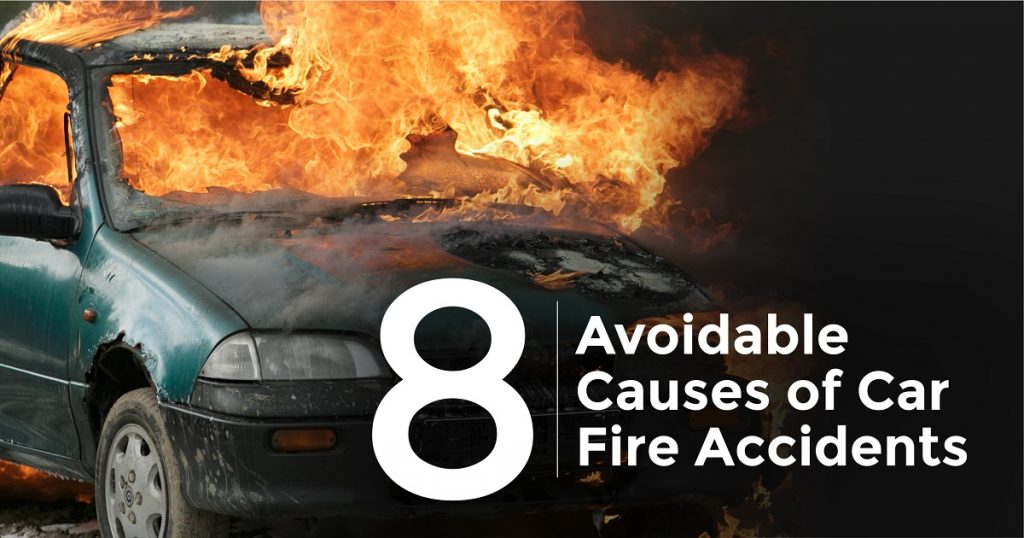One of the scariest things you can experience as a car owner can is to have your car going up in flames. Car fire accidents are common but quite avoidable. Such accidents can be triggered a range of factors; from manufacturer’s design flaws to user’s neglect of electrical and mechanical problems.
However, you don’t have to experience the trauma of car fire accidents if you take proactive measures like knowing the possible causes as well as how to avoid them. Below are some common causes of car fire accidents.

Fuel System Leakage
This a common cause of car fire accidents. Fuel and diesel are highly flammable and become dangerous when exposed. Fuel leaks are especially a great danger. Even when external factors ignite a fire within a car, the fire becomes overwhelming as soon fuel interferes.
Faulty Catalytic Converters
It is normal for the catalytic converters to generate heat. However, it becomes a grave concern if it starts to fail due to excessive amounts of unburned fuel. The misfiring of spark plugs or a leak in the valve could lead to excessive unburned fuel.
After-Market Accessories
Some car owners, in the name of customising their rides, buy after-market accessories such as stereos, security systems, head-lamps, and reverse parking sensors. While fitting these accessories into the car, there is a possibility that the worker may snap a wire and this may go undetected until it short circuits.
Fluid Leak
Many car owners are only concerned about fuel leakage when there is a fluid leak in the car. What they probably forget is that there are other fluids that are not as flammable as fuel, but could still whip up flames. Coolant, brake fluid and windshield washer fluid are renowned for their ability to ignite a fire if put close to a condition that encourages it.
So, don’t ignore any fluid leak from your car because you don’t consider it to be the same as fuel. If there is a leak, have it checked, regardless of the type of fluid that it is.

Engine Overheat
Although overheating alone won’t set your car up in flames, we cannot say the same about its effects. Overheating leads to a chain reaction that involves internal liquids boiling as the engine overheats. This could lead to an overflow of fluids to other hot parts of the car; giving off a spark and eventually flames.
It is advisable to give the engine time to cool off once you sense overheating.
Electrical Wiring Failure
Electrical and mechanical failures are some major causes of car fire accidents. These include problems such as heated seats, heating systems, batteries and aftermarket accessories. Sometimes, a frayed, stray wire could portend great danger.
Beware of loose or cracked wires inside your car and if you notice anything out of place, spare no time in contacting your car technician. An electrical wire failure could cause a spark and erupt into a full-blown car fire accident. All that needs to be present is a worn-out wire and a hydrogen gas build up along the engine bay. The car can go up in flames once the spark connects with leaking fluid, such as fuel.
Car Accidents
Auto collisions can end in car fire accidents. This depends on the side of the car that was hit. For example, the petrol tank, if hit, could start leaking and eventually give out an explosive noise and fire.
Storing Fuel/Gas in Your Car
Have you ever wondered if it is safe to store spare petrol or fuel in the boot of your car on a permanent basis? Well, the answer is no even if it is in a metal container that has been solidly strapped in.
Records have shown that temperature in Nigeria can rise as high as 47.2 °C (117.0 °F), which is also the highest recorded temperature in Nigeria. Based on this, we know that the temperature in the booth of your car can rise really high; raising the pressure in the container, which, if vented out, would fill the car with vapour that can become explosive.
You should not forget that the petrol tank in a car is not in the cabin or boot. It is in the shade beneath the car and an accident might cause the container to rupture.

Final Thoughts on Car Fire Accidents
Prevention remains the safest policy when it comes to car fire accidents. The following measures will prove useful in preventing car fires:
Observe regular maintenance of your car and rectify any problems as soon as possible
Flammable products should not be left in the cabin of your car
A dry fire extinguisher is a must-have in your car and you should practice how to use it even before a real fire occurs
Never joke with warning signs – For instance, an unusual noise from the engine, electrical problems, fuel leaks, and rapid changes in the fuel level. Also, look out for smoky engine, higher-than-normal engine temperature, vibrations or warning lights from the dashboard.
On a final note, you need to get an insurance policy for your car. The purpose of an insurance policy is to ensure that your car is protected at all times, especially in the case of an unfortunate incident. Get started
